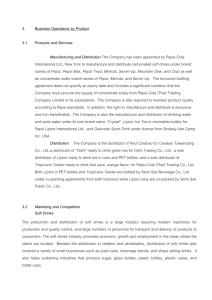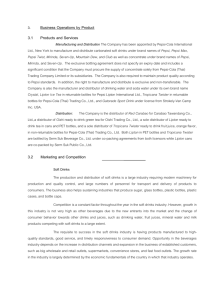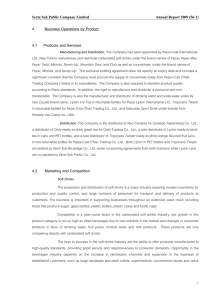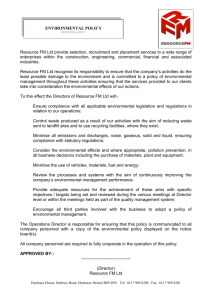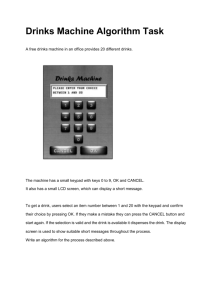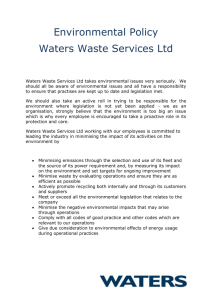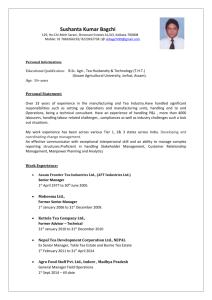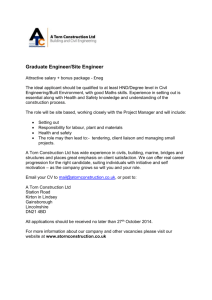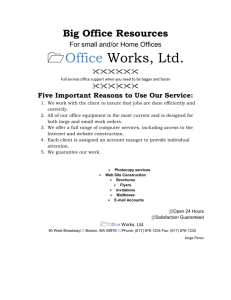SECTION 1 : EXECUTIVE SUMMARY
advertisement
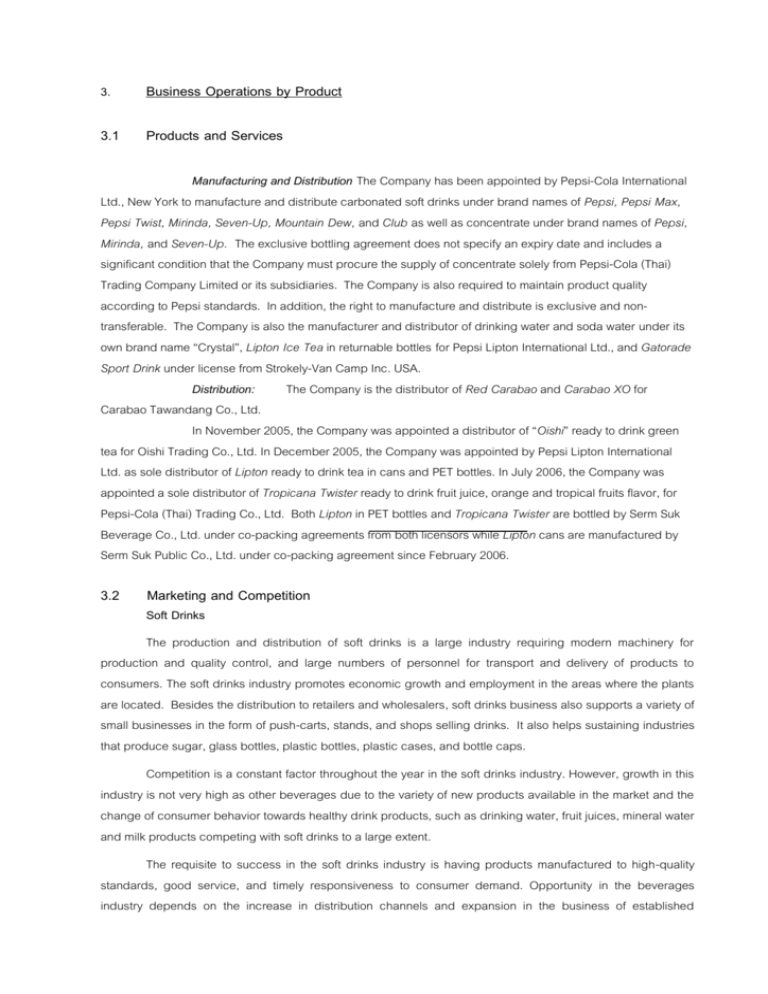
3. Business Operations by Product 3.1 Products and Services Manufacturing and Distribution The Company has been appointed by Pepsi-Cola International Ltd., New York to manufacture and distribute carbonated soft drinks under brand names of Pepsi, Pepsi Max, Pepsi Twist, Mirinda, Seven-Up, Mountain Dew, and Club as well as concentrate under brand names of Pepsi, Mirinda, and Seven-Up. The exclusive bottling agreement does not specify an expiry date and includes a significant condition that the Company must procure the supply of concentrate solely from Pepsi-Cola (Thai) Trading Company Limited or its subsidiaries. The Company is also required to maintain product quality according to Pepsi standards. In addition, the right to manufacture and distribute is exclusive and nontransferable. The Company is also the manufacturer and distributor of drinking water and soda water under its own brand name “Crystal”, Lipton Ice Tea in returnable bottles for Pepsi Lipton International Ltd., and Gatorade Sport Drink under license from Strokely-Van Camp Inc. USA. Distribution: The Company is the distributor of Red Carabao and Carabao XO for Carabao Tawandang Co., Ltd. In November 2005, the Company was appointed a distributor of “Oishi” ready to drink green tea for Oishi Trading Co., Ltd. In December 2005, the Company was appointed by Pepsi Lipton International Ltd. as sole distributor of Lipton ready to drink tea in cans and PET bottles. In July 2006, the Company was appointed a sole distributor of Tropicana Twister ready to drink fruit juice, orange and tropical fruits flavor, for Pepsi-Cola (Thai) Trading Co., Ltd. Both Lipton in PET bottles and Tropicana Twister are bottled by Serm Suk Beverage Co., Ltd. under co-packing agreements from both licensors while Lipton cans are manufactured by Serm Suk Public Co., Ltd. under co-packing agreement since February 2006. 3.2 Marketing and Competition Soft Drinks The production and distribution of soft drinks is a large industry requiring modern machinery for production and quality control, and large numbers of personnel for transport and delivery of products to consumers. The soft drinks industry promotes economic growth and employment in the areas where the plants are located. Besides the distribution to retailers and wholesalers, soft drinks business also supports a variety of small businesses in the form of push-carts, stands, and shops selling drinks. It also helps sustaining industries that produce sugar, glass bottles, plastic bottles, plastic cases, and bottle caps. Competition is a constant factor throughout the year in the soft drinks industry. However, growth in this industry is not very high as other beverages due to the variety of new products available in the market and the change of consumer behavior towards healthy drink products, such as drinking water, fruit juices, mineral water and milk products competing with soft drinks to a large extent. The requisite to success in the soft drinks industry is having products manufactured to high-quality standards, good service, and timely responsiveness to consumer demand. Opportunity in the beverages industry depends on the increase in distribution channels and expansion in the business of established customers, such as big wholesale and retail outlets, supermarkets, convenience stores, and fast food outlets. The growth rate in the industry is largely determined by the economic fundamentals of the country in which that industry operates. The prospects for growth and development in the soft drink industry depends mainly upon marketing activities, including advertising, sales promotion, use of new forms of packaging, and the introduction of new flavors that can attract consumers. All these efforts contribute to expansion in the industry. The intensity of competition in the soft drink industry, therefore, demands continual improvement as each company strives to keep abreast of trends. There are only a few companies in this sector. New entrants into the soft drinks industry must invest very large sums in building distribution systems, hiring personnel, and achieving recognition for their products. The bargaining power of buyers depends upon the quantity of their purchase or the extent of the agreements between them. In 2006, a new operator has entered the soft drinks market with a product under “Big Cola” brand, emphasizing on its bigger volume and cheaper price compared to products in the market. The entrance of this operator has not taken away the Company’s share in the cola segment, as the Company still grew in this segment consistently with close follow-up on market movement and continuing effort to protect and increase market share for the Company’s products. Crystal Drinking Water The marketing promotion strategy used for Crystal drinking water is to emphasize on its quality and service to the customers. This method is chosen in view of the drinking water market, in which a plethora of producers compete with no difference in price among them. Beside the Company’s Crystal drinking water, other major players with the large market segment are Singha Drinking water, Pure Life, and Nam Thip. Despite the competitors’ strong efforts to push their products into the market through the available distribution channels, sales of Crystal drinking water continued to show very strong growth over the past year with 45 percent increase of its sales volume. The success of Crystal is attributed to its high quality standards with a certification from NFS International, an international audit agency who inspects and certifies quality standards of the bottled drinking water. Crystal is the only Thailand drinking bottled water to receive this certificate. In addition, from the recent consumer survey in 2006, Crystal won increasing votes in several aspects from the previous survey in 2003. Lipton Ice Tea When Unilever Thai Holdings Co., Ltd., one of Thailand’s largest producers and distributors of consumer products, entered the ready-to-drink tea market in Thailand with its Lipton Ice Tea, in both cans and bottles, it wished to use Serm Suk’s expertise in the soft drinks industry as both a producer and nation-wide distributor. Serm Suk was appointed as the licensed manufacturer and sole distributor of Lipton Ice Tea. This made Serm Suk the first truly integrated beverages company in Thailand. Various promotional activities were organized jointly by Unilever and Serm Suk resulting in rapid growth in sales. In 2004 PepsiCo and Unilever entered into a global joint venture, Pepsi Lipton International Ltd., to promote the sale of Lipton Ice Tea primarily through the Pepsi bottling system. Serm Suk continues to manufacture and distribute Lipton Ice Tea in returnable bottles and cans but does so now under the authority of Pepsi Lipton International Ltd. This is another step forward in Serm Suk's relations with PepsiCo to co-operate and develop opportunities connected to non carbonated beverages. In 2006, Lipton tea in 500 ml. PET bottles was introduced to the market. The bottling of the product is done by Serm Suk Beverage Co., Ltd., a subsidiary company of Serm Suk while distribution is still by Serm Suk Public Co. Ltd., as with other Lipton products. In addition, in order to align the manufacturing and distribution set up for the production after the introduction of new Lipton PET, the agreement for the manufacturing of Lipton cans has been amended to a co-packing agreement by Serm Suk Public Co. Ltd. as a co-packer and distributor of the product. The manufacturing and distribution of Lipton in returnable bottles is still under the unchanged original agreement. Gatorade Sport Drink The Company has been appointed by Strokely-Van Camp Inc. as its sole manufacturer and distributor in Thailand for Gatorade Sport Drink, the world no. 1 sport drink. Gatorade is a recognized and favorite sport drink with its better performance than the other sport drinks. Gatorade is also scientifically formulated to have the right taste and good absorption without carbonation, which is good for athletes and anyone who loses liquid by perspiration. Gatorade is distributed in 400 ml and 250 ml glass bottles and has two flavors, lemon and grape. Major competitors are Sponsor Sport Drink and M Sport. Tropicana Twister Fruit Juice Another step towards being a total beverage company was the launch of 10% fruit juice under “Tropicana Twister” brand. The products are manufactured by Serm Suk Beverage Co., Ltd. and distributed by Serm Suk Public Co., Ltd. The products are in 2 flavors, orange and tropical fruits, in 250 ml. non-returnable glass bottles and 350 ml. PET bottles. The introduction of Tropicana Twister provides another alternative for the consumers to fulfill their needs towards healthy products. Red Carabao After returning the distribution right of M products to Osotsapa Co. Ltd. in September 2002, the Company signed a contract with Carabao Tawandang Co., Ltd. for the distribution of a new energy drink “Red Carabao”. This was first launched in October 2002 with Serm Suk’s efficient distribution network and 17 years of experience in energy drinks, as well as the strength of the “Red Carabao” brand. In 2005, Carabao Tawandang Co., Ltd. introduced “Carabao XO”, an energy drink with whisky flavor, having Serm Suk as distributor. Oishi Green Tea With the growing trend towards green tea consumption in the past 3-4 years, Serm Suk has entered into an agreement with Oishi Trading Co., Ltd. to distribute “Oishi” ready to drink green tea. With its long years experience and capability, the distribution was awarded to the Company for 3 years starting from November 2005 onwards for traditional trade channel. 3.3 Products and Services Sourcing Sources of key materials are as follows: Concentrates of Pepsi, Pepsi Max, Pepsi Twist, Mirinda, Seven-Up, Mountain Dew, and Club are sourced by Pepsi-Cola (Thai) Trading Co., Ltd. Concentrates of Lipton, peach and lemon are sourced by Pepsi-Cola (Thai) Trading Co., Ltd. Concentrates of Tropicana Twister fruit juice and Gatorade are sourced by Pepsi- Cola (Thai) Trading Co., Ltd. for the co-packers. Distributed goods such as Red Carabao and Oishi Green Tea are sourced directly from the manufacturers and the product owners. Other materials for production such as sugar, hi-fructose 55%, CO2, chemicals, bottles, crown seals, plastic cases, PET bottles, can, and paper boxes are locally sourced. No material sourced from a single supplier represents more than 30% of total purchasing value. Currently production has been run in 5 plants 1) Pathumthani Plant Located at 63 Nonthaburi-Pathumthani Road, Tambol Kayang, Muang District, Pathumthani Provinces 2) Nakornratchasima Plant Located at 211 Moo 4, Nakornratchasima-Kabinburi Road, Muang District, Nakornratchasima Province 3) Nakornsawan Plant Located at 72 Paholyothin Road, Tambol Nakornsawan Oak, Muang Distric, Nakornsawan Province 4) Suratthani Plant Located at 11 Moo 5, Asia 41 Road, Tambol Tarongchang, Pun Pin District, Suratthani Province 5) Chonburi Plant Located at 700/369 Moo 6, Tambol Nong Mai Daeng, Chonburi District, Chonburi Province Production Capacity and Production Volume Full Capacity (Unit: bottle per hour) Soft drinks Actual Production Volume (Unit: bottle per hour) Soft drinks Utilization (%) Increase/(decrease) (%) 2006 2005 2004 560,041 575,510 583,186 533,475 95.3% +5.9% 514,710 89.4% +3.1% 503,101 86.3% -0.1% In 2006, the production of soft drink in 10 oz. size continued decreasing while 15 oz size showed an increase. Proportion of 10 oz. vs. 15 oz. production was 40:60 in 2005 and 35:65 in 2006. This caused the reduction of total production capacity per hour. Environmental Impacts Wastewater Treatment With over 50 years of operations, Serm Suk Public Company Limited has realized the importance of environmental issue. It is one of the pioneer companies who introduced the high standard wastewater treatment system to its waste elimination process. Currently it has been used as a showcase for students and other business operators pursuing knowledge and experience in waste elimination management. With high regard of social responsibilities and environmental protection, the Company has invested in the standard wastewater treatment according to the governmental regulations in every plant set up in the provincial areas. In particular, at Pathumthani plant which locates on the bank of Chao Phraya River, Thailand’s most important river, the Company has invested close to Baht 50 million to construct a powerful system for wastewater treatment before draining down into the river in accordance with the standard set by the Ministry of Industry and Ministry of Transportation which is as follows: PH Standard BOD (ppm) COD (ppm) 5.5-9.0 < 20 < 120 TSS (ppm) TDS (ppm) TKN (ppm) Grease & Oil < 50 < 3000 < 100 <5 River Transportation System for Better Pollution Control The Company is the first who introduced river transportation system since 1980. With continuing development, currently the Company has 3 engine boats and 4 tuck boats in operation. Each of these tuck boats has a capacity to transport up to 8,640 cases of beverage, which is equivalent to the capacity of 10 transportation trucks. River transportation is not only for cost saving purpose but it also helps reducing pollution and traffic problem and promotes energy preservation for the nation. 3.4 Undelivered Project - None –
